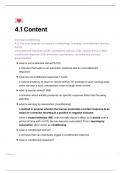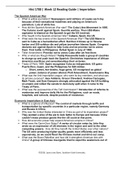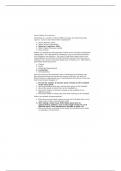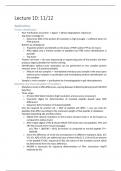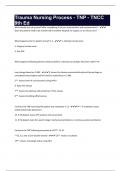💌
4.1 Content
Classical conditioning
4.1.1 The main features of classical conditioning, including: unconditioned stimulus
(UCS);
unconditioned response (UCR); conditioned stimulus (CS); neutral stimulus (NS);
conditioned response (CR); extinction, spontaneous recovery and stimulus
generalisation.
what is unconditioned stimuli?(UCS)
a stimulus that leads to an automatic response aka an unconditioned
responce.
what are unconditioned responses? (UCR)
a natural tendency to react to certain stimuli, for example to start running away
when we hear a loud, unexpected noise or laugh when tickled.
what is neutral stimuli? (NS)
a stimulus which initially produces no specific response other than focusing
attention
what is learning by association (conditioning)
a method or process wherein the learner associates a certain response to an
object or a stimulus resulting in a positive or negative outcome
when a neutral stimulus (NS) that normally doesn’t affect us is paired over a
period of time with a UCS, the two become associated. This is learning by
association, also known as conditioning.
what is conditioned stimuli?
a stimulus that can eventually trigger a conditioned response
what is conditioned response?
4.1 Content 1
, the response made by a person or animal after learning to associate an
experience with a neutral or arbitrary stimulus
what does the term extinction in learning association mean?
decrease in the conditioned response when the unconditioned stimulus is no
longer paired with the conditioned stimulus
what does spontaneous recovery mean?
return of a previously extinguished conditioned response.
what is habituation mean?
when we learn not to respond to a stimulus that is presented repeatedly
without change.
What is stimulus Generalisation in psychology?
Stimulus generalisation is the ability to behave in a new situation in a way that
has been learned in other similar situations. The problem is how to learn which
aspects of the learning situations should be generalised.
4.1.2 Pavlov (1927) experiment with salivation in dogs.
In Pavlov 1927 experiment what was the unconditioned stimuli?
The dog food was the UCS.
what was the UCR?
In Pavlov's experiment, the food was the unconditioned stimulus. An
unconditioned response is an automatic response to a stimulus. The dogs
salivating for food is the unconditioned response in Pavlov's experiment.
what did Pavlov use as his NS (Neutral stimulus)
Metronome (Sound of a bell) as his neutral stimulus
- By itself the metronome did not elcit a response from the dogs.
How did Pavlov begin the conditioning procedure?
Clicking metronome was introduced just before he gave food to his dogs.
After a number of repeats (trials) of this procedure he presented the
metronome on its own.
4.1 Content 2
, Conditioned Stimulus (Metronome) > Conditioned Response(Salivate)
Dog had learned an association between the metronome and the food and a
new behavior had been learned.
What did Pavlov discover about contiguity?
For associations to be made, the two stimuli had to be presented close
together in time
- law of temporal contiguity.
- If time between conditioned stimulus and unconditioned stimulus is too
great, then learning will not occur.
Operant conditioning
4.1.3 The main features of operant conditioning, including: types of reinforcement
and punishment
(positive and negative).
What is operant conditioning?
learning through consequences.
Through operant conditioning an association is made between a behaviour
and a consequence for that behaviour.
If we get punished for a behaviour according to the theory it is less likely that
we repeat the behaviour .
However if the behaviour is followed by positive experience maybe praise or
some physical reward - it is likely that this behaviour is repeated.
e.g. when a pigeon taps a blue button it receives a food pallet and if it taps the
red one it receives an electric shock. As a result of learning through
consequences the pigeon learn to press the blue button but avoid the red
button in future.
How did skinner incorporate his scientific methods in the learning approach?
Skinner used lab experiments with his 'skinner box' which was essentially a
box that could dispense food and electric shocks to animals such as rats or
4.1 Content 3
4.1 Content
Classical conditioning
4.1.1 The main features of classical conditioning, including: unconditioned stimulus
(UCS);
unconditioned response (UCR); conditioned stimulus (CS); neutral stimulus (NS);
conditioned response (CR); extinction, spontaneous recovery and stimulus
generalisation.
what is unconditioned stimuli?(UCS)
a stimulus that leads to an automatic response aka an unconditioned
responce.
what are unconditioned responses? (UCR)
a natural tendency to react to certain stimuli, for example to start running away
when we hear a loud, unexpected noise or laugh when tickled.
what is neutral stimuli? (NS)
a stimulus which initially produces no specific response other than focusing
attention
what is learning by association (conditioning)
a method or process wherein the learner associates a certain response to an
object or a stimulus resulting in a positive or negative outcome
when a neutral stimulus (NS) that normally doesn’t affect us is paired over a
period of time with a UCS, the two become associated. This is learning by
association, also known as conditioning.
what is conditioned stimuli?
a stimulus that can eventually trigger a conditioned response
what is conditioned response?
4.1 Content 1
, the response made by a person or animal after learning to associate an
experience with a neutral or arbitrary stimulus
what does the term extinction in learning association mean?
decrease in the conditioned response when the unconditioned stimulus is no
longer paired with the conditioned stimulus
what does spontaneous recovery mean?
return of a previously extinguished conditioned response.
what is habituation mean?
when we learn not to respond to a stimulus that is presented repeatedly
without change.
What is stimulus Generalisation in psychology?
Stimulus generalisation is the ability to behave in a new situation in a way that
has been learned in other similar situations. The problem is how to learn which
aspects of the learning situations should be generalised.
4.1.2 Pavlov (1927) experiment with salivation in dogs.
In Pavlov 1927 experiment what was the unconditioned stimuli?
The dog food was the UCS.
what was the UCR?
In Pavlov's experiment, the food was the unconditioned stimulus. An
unconditioned response is an automatic response to a stimulus. The dogs
salivating for food is the unconditioned response in Pavlov's experiment.
what did Pavlov use as his NS (Neutral stimulus)
Metronome (Sound of a bell) as his neutral stimulus
- By itself the metronome did not elcit a response from the dogs.
How did Pavlov begin the conditioning procedure?
Clicking metronome was introduced just before he gave food to his dogs.
After a number of repeats (trials) of this procedure he presented the
metronome on its own.
4.1 Content 2
, Conditioned Stimulus (Metronome) > Conditioned Response(Salivate)
Dog had learned an association between the metronome and the food and a
new behavior had been learned.
What did Pavlov discover about contiguity?
For associations to be made, the two stimuli had to be presented close
together in time
- law of temporal contiguity.
- If time between conditioned stimulus and unconditioned stimulus is too
great, then learning will not occur.
Operant conditioning
4.1.3 The main features of operant conditioning, including: types of reinforcement
and punishment
(positive and negative).
What is operant conditioning?
learning through consequences.
Through operant conditioning an association is made between a behaviour
and a consequence for that behaviour.
If we get punished for a behaviour according to the theory it is less likely that
we repeat the behaviour .
However if the behaviour is followed by positive experience maybe praise or
some physical reward - it is likely that this behaviour is repeated.
e.g. when a pigeon taps a blue button it receives a food pallet and if it taps the
red one it receives an electric shock. As a result of learning through
consequences the pigeon learn to press the blue button but avoid the red
button in future.
How did skinner incorporate his scientific methods in the learning approach?
Skinner used lab experiments with his 'skinner box' which was essentially a
box that could dispense food and electric shocks to animals such as rats or
4.1 Content 3

